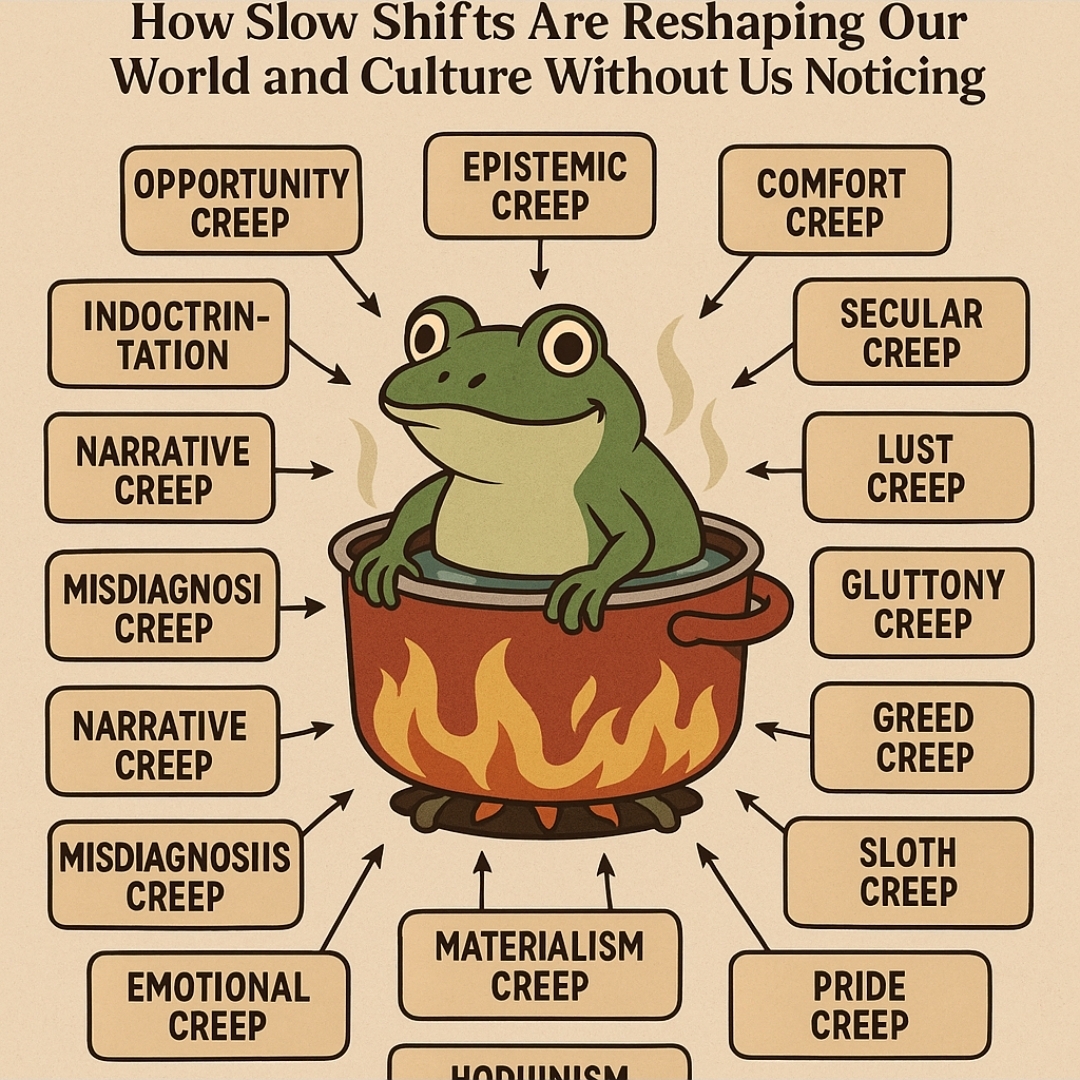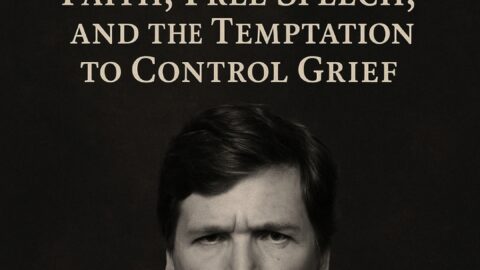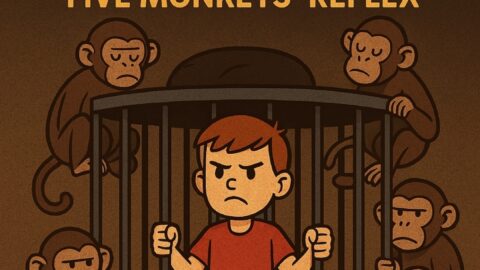Most people imagine threats to freedom, morality, or faith as sudden events — a revolution, a war, a crash.
But in reality, the most dangerous changes rarely come with a loud bang.
They creep in quietly, slowly, almost invisibly, until one day you wake up in a world you no longer recognize.
These “creeps” aren’t about horror movie monsters.
They’re the subtle, step-by-step changes that reshape values, rewrite rules, and hand over control without a fight.
Let’s break them down.
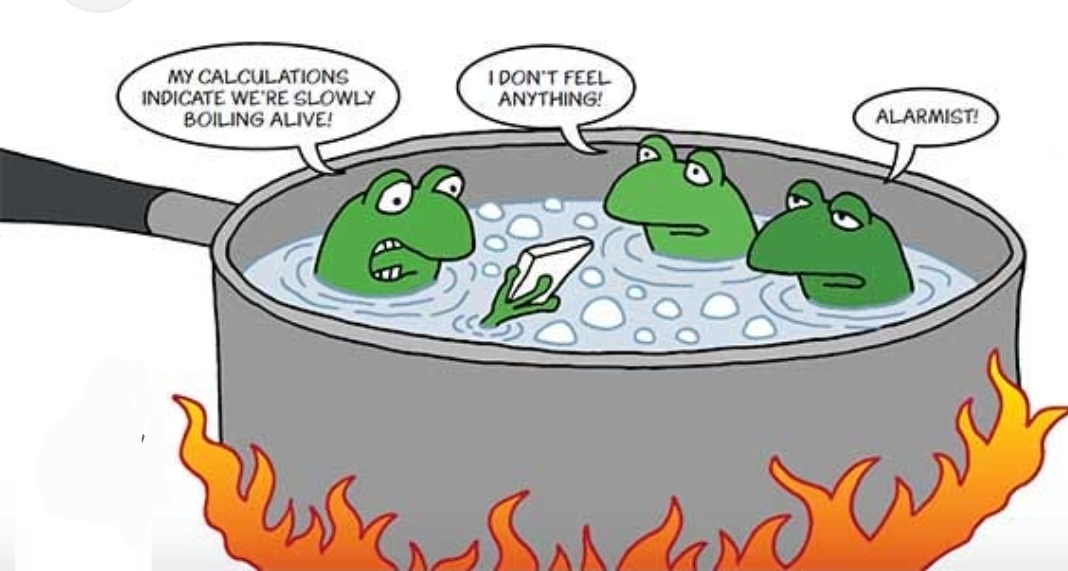
Agency Creep
Agency — the power to act according to your own values — rarely disappears overnight.
It’s chipped away in subtle, almost invisible steps.
Rules change. Options shrink. Choices get framed so narrowly that the “freedom” left to you is a false one.
Vote for the lesser of two evils.
Pick between two bad policies.
Accept the job or lose your health insurance.
Each time, you tell yourself you’re still choosing — but your range of movement gets smaller and smaller.
One day you wake up and realize your agency wasn’t taken from you in a single blow… it was traded away, piece by piece, until the cage felt like home.
Vote for Lesser of Two Evils Creep
It starts as a “pragmatic” choice — hold your nose and pick the candidate who’s not as bad.
You tell yourself it’s temporary, just this election, just to avoid disaster.
But soon, both sides learn they can drift further from your values because you’ll always vote to block the worse option.
Your moral compass dulls, your standards lower, and every cycle the “lesser” evil becomes more evil than the last.
Before long, you’re not choosing a leader — you’re choosing your flavor of decline.
Moral Creep
Moral lines don’t usually disappear overnight — they fade.
What was once unthinkable gradually becomes acceptable.
Language shifts. Movies and TV push boundaries a little further each year.
The next generation grows up thinking “it’s just normal.”
Before long, society’s compass isn’t broken — it’s been quietly reprogrammed.
Moral Relativism Creep
It starts with “Your truth” and “My truth.”
Then, absolute right and wrong are replaced by shifting feelings and situational ethics.
Every standard becomes negotiable — justice depends on popularity, morality depends on convenience.
Soon, conscience is drowned out by consensus, and the only “wrong” is claiming something is truly wrong.

Marriage Deconstruction Creep
It starts with small shifts — marriage is “just a piece of paper,” vows are “just tradition.”
Then commitment becomes optional, loyalty negotiable, and the idea of “forever” a punchline.
Media romanticizes infidelity, celebrates casual flings, and paints stability as boring.
Soon, what once anchored families becomes just another disposable arrangement in a culture built on convenience.
Family Creep
At first, it’s just being “too busy” for family dinners.
Then it’s careers over connection, screens over conversation, institutions raising children while parents are away.
The bonds that once formed the backbone of society weaken, replaced by fractured households and generational disconnection.
By the time we notice, “family” is no longer a foundation — it’s a marketing word on greeting cards.
Character Deconstruction Creep
It begins with small moral compromises — “It’s just business,” “Everybody does it.”
Then honesty, courage, and integrity are reframed as outdated or naïve.
Heroes are rewritten as flawed antiheroes, virtue becomes suspect, and values bend to fit the moment.
Soon, the idea of building a good name is replaced by building a personal brand.
Religious Deconstruction Creep
It begins subtly — questioning traditions not to seek deeper truth, but to erode them.
Faith is reframed as outdated, oppressive, or irrelevant.
Moral absolutes are replaced with “personal truth,” and devotion is swapped for consumer-style spirituality.
Over time, shared beliefs fragment, sacred institutions hollow out, and religion becomes a brand — stripped of the power to guide, unite, or challenge.
Religious Illiteracy Creep
It begins when people stop knowing what they claim to believe.
Sacred texts go unread, doctrines go unexplored, and history is forgotten.
Faith becomes a vague feeling rather than an informed conviction.
Without literacy in belief, people fall prey to counterfeit religions, false prophets, or empty ritualism that offers no moral compass.
Psychological Creep
It begins with subtle nudges.
Behavioral tricks in apps. Persuasive ads. Media framing.
Then come the emotional hooks — outrage, shame, desire.
Before long, our thoughts are shaped by unseen hands, and we call it “our opinion.”
Emotional Creep
Feelings are real, but they aren’t always right.
At first we “listen to our heart” — then we let emotions lead every decision.
Logic, truth, and perspective are drowned out by mood and impulse.
Soon our lives swing wildly with every high and crash, and stability is just a memory.
Comfort Creep
This is the slow erosion of courage.
When comfort becomes the top priority, people stop taking risks, stop asking hard questions, and stop standing up for what’s right.
We trade freedom for convenience, security for ease, and moral backbone for “getting along.”
Over time, comfort creep turns once-brave citizens into passive spectators.
Greed Creep
It starts with wanting enough to be secure.
Then enough to be comfortable. Then enough to be untouchable.
Each gain only makes the hunger grow.
Until people become means to profit, and morality becomes a cost to cut.
Hopiumism Creep
The narcotic of false hope that delays action, pacifies resistance, and empowers the slow advance of tyranny under the illusion of a ‘plan.’ Hope can inspire — but when weaponized, it paralyzes.
“Trust the plan.” “Just wait.” “The good guys are in control.”
Each promise buys more time for those in power. Each delay saps urgency from the people.
Soon we’re waiting for heroes who never come, mistaking passivity for patience, and surrendering action for a false sense of destiny.
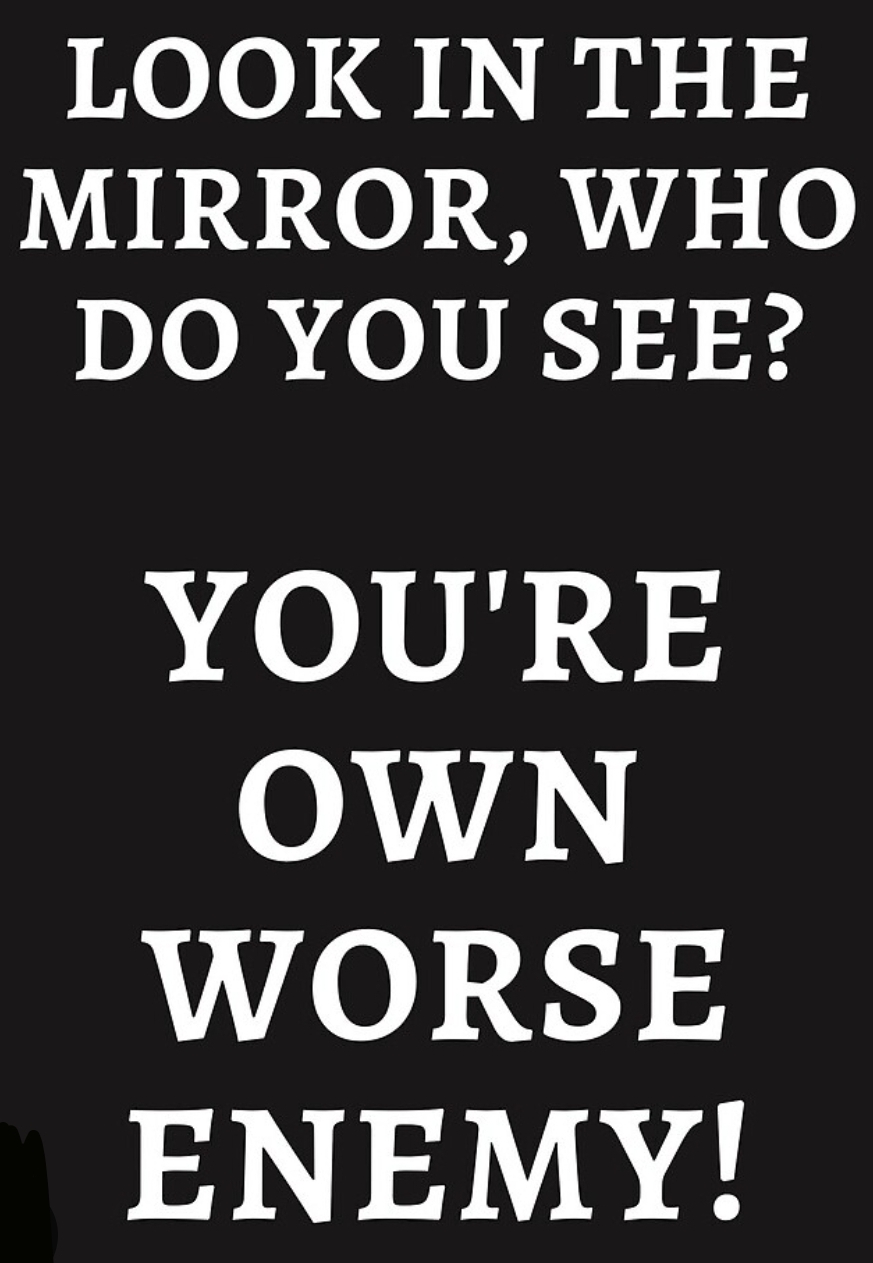
Fear Creep
Fear is a powerful tool — and it works best in small doses.
First it’s fear of one crisis. Then another. Then another.
Terrorism. Pandemics. Economic collapse. Climate disaster.
Each fear justifies a little more control, a little more surveillance, a little less freedom.
Soon we’re living in a constant state of low-grade panic, too distracted to notice what we’ve lost.
Control Creep
Laws, rules, and restrictions tend to only go in one direction — more.
And each new rule is “just a small thing,” not worth fighting over.
But they stack up.
Soon you have to ask permission for things that used to be your right.
Control creep is how freedom disappears without anyone storming the gates.
Despair Creep
Hopelessness doesn’t appear overnight — it grows.
One setback, then another, then a season of disappointment.
We stop believing change is possible, stop trying, stop caring.
Soon we’re not living, just existing — and the world moves on without us.
Vanity Creep
Self-care is fine — but vanity feeds a hollow self.
First it’s caring about how we look, then needing others to notice, then living for their approval.
Our reflection becomes our prison.
Soon our worth is tied entirely to an image that’s always fading.
Envy Creep
Admiration turns to jealousy, jealousy to bitterness.
We measure ourselves against others, and every success they have feels like a loss to us.
Soon we can’t celebrate anyone’s good without feeling smaller ourselves — and resentment rots the heart.
Wrath Creep
Anger can be righteous — but it rarely stays that way.
It starts as frustration, then grievance, then vengeance.
Soon every disagreement is war, every opponent an enemy.
The fire we think will cleanse only consumes.
Sloth Creep
Rest is good. But sloth is rot.
At first it’s harmless procrastination. Then avoidance. Then apathy.
We tell ourselves we’ll get to it tomorrow — until tomorrow never comes.
Soon opportunities are gone, discipline is dead, and comfort has become a coffin.
Gluttony Creep
More is always better — until it’s not.
A little indulgence turns into constant excess.
We eat, drink, and consume not for need, but for comfort, distraction, and escape.
Soon the body is sluggish, the mind is dull, and the will is weak.
Lust Creep
Desire is natural — but without discipline, it becomes an idol.
It starts with suggestion, then indulgence, then normalization.
Soon boundaries blur, relationships fracture, and people become products.
By the end, intimacy is replaced by consumption, and love by appetite.
Pride/Ego Creep
Confidence is healthy — but ego is a slow poison.
First it’s just ambition. Then it’s comparison. Then it’s domination.
Every victory feeds the need to be seen as better, smarter, more important.
Until pride blinds us to truth, and ego makes us unteachable.
Secular Creep
Faith, moral absolutes, and spiritual discernment don’t vanish all at once.
They’re slowly edged out of daily life — in schools, in laws, in entertainment.
What was once the foundation becomes “outdated,” “intolerant,” or “irrelevant.”
The result is a society adrift, with no anchor beyond its own shifting desires.
Education Deconstruction Creep
It starts with small shifts — cutting “unnecessary” subjects, lowering standards, and reframing school as job training instead of formation of the mind.
Critical thinking is replaced with test prep.
True inquiry is replaced with indoctrination.
Eventually, education no longer produces informed citizens but compliant workers, unable or unwilling to challenge the system that trained them.
Spiritual Creep
Faith starts pure — rooted in truth, humility, and service.
Then comes the drift: softened doctrine, cultural compromise, marketing over mission.
Each concession seems small, each change harmless.
Until the eternal is traded for the fashionable, and the sacred becomes just another product.
Materialistic Creep
Needs become wants, wants become rights, rights become identity.
A new phone, a bigger house, a better brand — each one feels like progress.
Meanwhile, debt grows, gratitude shrinks, and our worth is measured in what we own.
Soon the soul is buried under the weight of its own possessions.
Dependency Creep
Bit by bit, self-reliance is replaced with reliance on “the system.”
We stop growing our own food, fixing our own things, solving our own problems.
Instead, we depend on government programs, global supply chains, and corporate services.
The more dependent we are, the less power we have to say “no” when the terms change.
Narrative Creep
History is rewritten in the smallest edits.
News stories get a slightly different spin.
Schoolbooks leave out one detail and add another.
Over decades, the story of who we are and what happened before changes entirely.
The past is reshaped to justify the present — and the truth becomes whatever the narrative says it is.
Legal Creep
Laws are meant to protect, but slowly they begin to control.
One new regulation here, one emergency measure there.
Each is “temporary,” each “for your safety,” each a “necessary update.”
Soon the law becomes a maze designed to trap the citizen, while the powerful move freely through secret doors.
Agenda Creep
This happens when a project, policy, or organization quietly expands its goals beyond the original purpose.
It’s the “we’re just doing this for safety” program that suddenly includes financial monitoring, speech restrictions, or political targeting.
The goalposts move — and most people don’t notice until the field has completely changed.
Epistemic Capture
This one sounds complicated, but it’s simple:
If the sources you trust for information are controlled, then your thinking is controlled.
It’s when your media, experts, and authorities all operate inside the same echo chamber — shaping what you believe by shaping what you see.
Opportunity Cost
Every choice has a cost.
If you’re focused on the wrong problem — or a fake problem — you’re losing time, money, and attention that could have gone to the real one.
The powers that be love to keep us chasing distractions because it means we never deal with what actually matters.
Immaturity Creep
It starts with glorifying youth and downplaying responsibility.
Adulthood becomes something to avoid, not embrace.
Seriousness is mocked, while perpetual adolescence is framed as “freedom.”
Over time, society fills with grown bodies making childlike decisions — without the wisdom or discipline to handle consequences.
Irresponsibility Creep
At first, it’s small — avoiding hard conversations, cutting corners, passing the buck.
Then it’s excused: “everyone does it,” “no one will notice.”
The habit spreads into institutions, families, and politics until accountability becomes rare.
Eventually, whole systems operate without ownership — leaving disasters for the next person to clean up.
Cultural Creep
Culture shifts slowly, and that’s the danger.
What was shocking yesterday is edgy today — and normal tomorrow.
Entertainment, slang, and fashion slowly redefine what’s acceptable.
By the time we notice, the moral compass is pointing somewhere entirely new, and the old landmarks are gone.
Cultural Illiteracy Creep
It starts when history, literature, and the arts are treated as optional luxuries instead of the foundations of civilization.
Pop culture replaces cultural heritage.
Shallow trends take the place of timeless wisdom.
Generations grow up unable to understand the references, stories, and values that once anchored their society.
In the absence of roots, identity becomes easy to manipulate.
Institution Creep
Institutions begin as servants — schools, churches, courts, media.
But little by little, they serve themselves.
Standards soften, accountability fades, and loyalty to the system replaces loyalty to truth.
Soon the very structures meant to safeguard society become its gatekeepers and jailers.
Technology Creep
Technology starts as a tool — helpful, efficient, empowering.
Then it’s in your pocket, then on your wrist, then in your home listening, watching, tracking.
Each update adds “convenience,” each device collects more of you.
Soon we can’t live without what we no longer control, and the tool becomes the master.
Media Creep
The news was once about informing the public.
Now it’s about holding attention — at any cost.
Fear, outrage, and drama replace fact, nuance, and depth.
Soon we see the world not as it is, but as the script demands — divided, distracted, and dependent on the next update.
Advertisement Creep
Ads used to sell products.
Now they sell lifestyles, identities, even values.
The line between content and persuasion blurs until everything is marketing.
Soon we’re buying not just what we want, but who we think we are.
Vice Creep
It begins as “harmless fun” or a “personal choice.”
Little indulgences grow into habits, habits into dependencies.
Vices are normalized through entertainment, advertising, and culture — celebrated as self-expression.
Soon, what once was shameful is worn as a badge of honor, and virtue is mocked as outdated.
Tyranny Creep
Freedom erodes slowly.
A small rule here, a harmless limit there, each one “for the greater good.”
We trade liberty for safety, then safety for obedience.
By the time we see the cage, it’s already locked — and the key is long gone.
Centralization Creep
Power works best when it’s close to the people.
But slowly, decision-making drifts upward — from local to state, from state to federal, from nations to global bodies.
Each shift promises efficiency, but delivers distance.
Soon our lives are run by people we’ll never meet, for reasons we’ll never know.
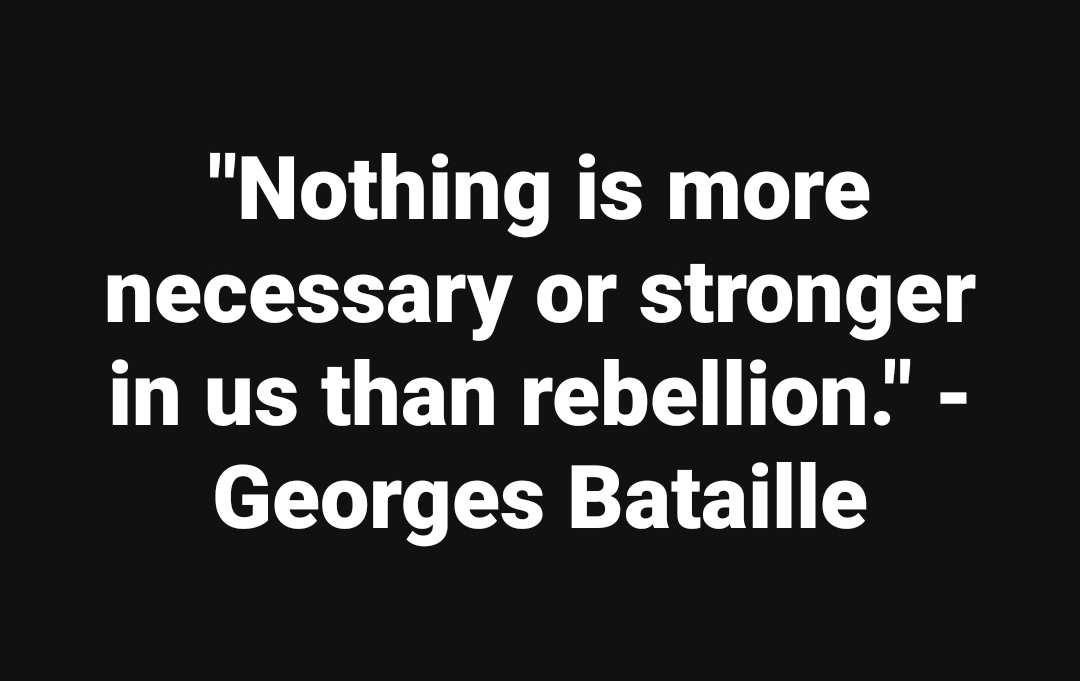
How They Work Together
- Materialistic and Pride/Ego Creeps fuel Greed, Envy, and Vanity Creeps.
- Hopiumism Creep pairs with Sloth Creep to keep people inactive while Agenda and Legal Creeps lock in control.
- Cultural and Psychological Creeps normalize Lust, Gluttony, and Wrath Creeps.
- Spiritual Creep creates the moral vacuum in which all others thrive.
The Real-World Impact
- On Nations: Liberty erodes, corruption solidifies, and people accept controls they would once have resisted.
- On Communities: Trust, unity, and shared values give way to division and self-interest.
- On Families: Generations drift apart as values shift and traditions fade.
- On the Individual: Clarity blurs, conviction weakens, and the pursuit of truth is replaced by the pursuit of comfort, status, or pleasure.
- On Faith: A living relationship with God is replaced by ritual, personality cults, or total abandonment of belief.
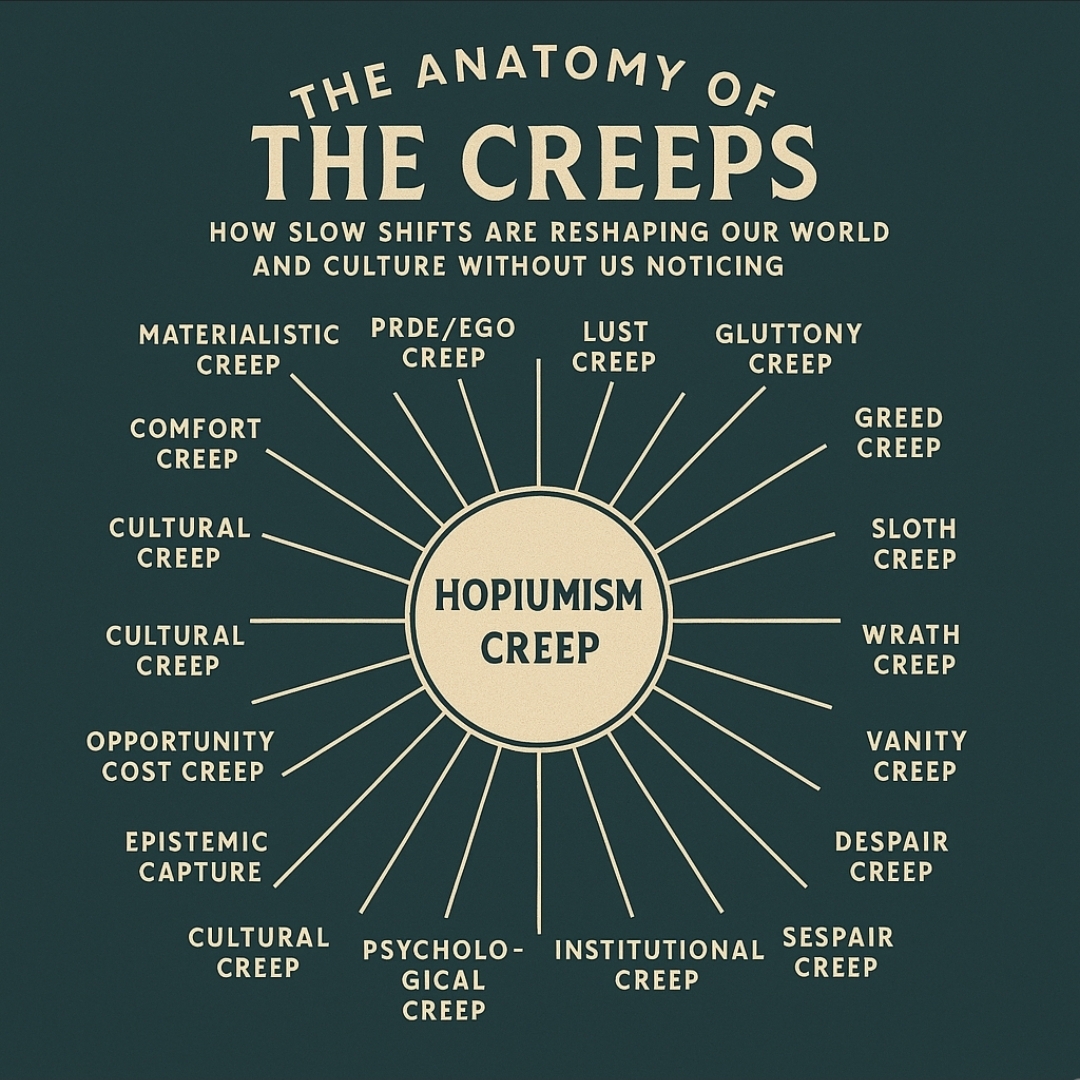
Why Creeps Work
The reason all these creeps are so dangerous is because they happen gradually.
No single step feels worth fighting over.
Each one is “just a small change,” “just temporary,” or “just for safety.”
But over years and decades, they add up to massive shifts in freedom, truth, morality, and independence.
These “creeps” — slow, incremental shifts that often go unnoticed — act like a cultural reprogramming machine. They don’t usually happen all at once. They work together in layers, reshaping what a nation, a community, a family, a church, and an individual believe is “normal” over time.
Here’s how they recreate our culture:
The Cultural Reprogramming Effect
When these creeps work together over decades:
- National values drift – Laws and leaders reflect vices more than virtues.
- Community bonds dissolve – Trust is replaced with suspicion and division.
- Family foundations weaken – Generations lose moral anchors.
- Churches lose prophetic voice – Faith institutions become echo chambers for culture.
- Individuals live in managed illusions – Freedom fades as comfort and distraction become life’s primary goals.
The net result is a culture remade in the image of its creeps — one that calls bondage “freedom,” vice “virtue,” and control “safety.”
On a Nation
When the creeps operate nationally, they form a macro-control system that seeps into every institution.
- Agenda Creep → Expansion of laws, regulations, and government scope under the cover of “safety” or “progress.”
- Epistemic Capture → Control over media, education, and “expert” opinion to limit public imagination.
- Opportunity Cost Creep → National wealth drained into wars, bailouts, or foreign aid instead of citizen prosperity.
- Comfort Creep → Consumerism and entertainment addiction replace civic duty.
- Moral Creep → National moral standards are quietly rewritten to suit elite interests.
- Fear Creep → Perpetual crisis narratives justify suspending liberties.
- Spiritual Drift Creep → God and transcendent morality are removed from national identity, replaced with relativism.
- Shifting the moral compass – Many of these creeps (pride, materialism, comfort, pleasure-seeking) slowly erode the shared moral framework. Government and media institutions normalize vice as “freedom” and virtue as “oppression.”
- Policy drift – Agenda creep, epistemic capture, and political misdiagnosis create laws and policies that slowly move from protecting liberty to enforcing control.
- Manufactured consent – Hopiumism and fear creep work together so people either “trust the plan” or remain too scared to challenge it, giving rulers a blank check to keep expanding their power.
- Economic reshaping – Materialistic creep and greed creep push a consumer-based economy that thrives on debt, waste, and dependence — making citizens easier to manipulate.
Result: A compliant, distracted population that tolerates central control.
On a Community
Communities experience the creeps as soft capture, often disguised as improvement.
- Agenda Creep → Local government adopts policies mimicking national overreach.
- Epistemic Capture → Local media and schools repeat national talking points without scrutiny.
- Opportunity Cost Creep → Community funds misallocated to vanity projects instead of urgent needs.
- Comfort Creep → Festivals and events are more about passive entertainment than civic engagement.
- Moral Creep → Local norms shift away from accountability toward permissiveness.
- Fear Creep → “Safety” becomes the justification for surveillance and restrictions.
- Spiritual Drift Creep → Faith in the community becomes performative or politically compromised.
- Changing social norms – Lust, envy, pride, and gluttony creeps seep into local culture through entertainment, advertising, and peer pressure. Over time, what was once scandalous becomes “fashionable.”
- Division creep – Fear, pride, and ideological creeps fracture neighbors into opposing camps. Instead of uniting around shared values, communities see each other as enemies.
- Dependency on external systems – Comfort creep replaces self-reliance with dependence on government programs or corporate convenience.
- Loss of local leadership – Hopiumism keeps people waiting for “someone else” to save the community instead of building grassroots leadership.
Result: A fractured local culture dependent on outside control.
On a Church
Churches are targeted because they represent an alternative moral authority to the state or culture.
- Agenda Creep → Church leadership adopts worldly frameworks for “relevance,” drifting from doctrine.
- Epistemic Capture → Sermons and teaching avoid controversial truths to maintain public favor or tax-exempt status.
- Opportunity Cost Creep → Resources go to entertainment-style programs rather than discipleship and service.
- Comfort Creep → The gospel is softened to avoid offending, replacing conviction with affirmation.
- Moral Creep → Cultural norms override biblical standards on morality and conduct.
- Fear Creep → Leaders and members avoid taking a stand on truth to avoid persecution.
- Spiritual Drift Creep → Worship becomes ritual or performance instead of genuine transformation.
- Doctrinal drift – Epistemic capture and agenda creep can infiltrate religious institutions, shifting focus from truth and repentance to “relevance” and “tolerance” at all costs.
- Prosperity gospel creep – Materialism and pride creeps turn faith into a means to gain wealth, status, or influence rather than holiness.
- Fear of offense – Fear creep causes churches to avoid hard truths, focusing only on comforting messages.
- Moral compromise – Lust and pleasure creeps normalize sin under the banner of “grace” without accountability.
Result: The church loses prophetic voice and becomes a reflection of the culture rather than a challenge to it.
On a Family
Families are targeted because they transmit values across generations.
- Agenda Creep → Government and outside influences replace parental authority through policy and culture.
- Epistemic Capture → Children and parents absorb conflicting “truths” from media, schools, and peers.
- Opportunity Cost Creep → Time once spent in shared meals, conversation, and teaching is consumed by devices, sports, or work schedules.
- Comfort Creep → Parents avoid hard but necessary conversations to “keep the peace.”
- Moral Creep → Standards for relationships, responsibility, and discipline shift to match pop culture.
- Fear Creep → Parents and children avoid standing out or defending beliefs to escape social backlash.
- Spiritual Drift Creep → Family prayer, scripture study, and shared worship are neglected.
- Generational moral shift – Children raised in environments dominated by comfort, materialism, or lust creeps often see those values as normal. Each generation accepts a lower standard than the last.
- Weakening of resilience – Gluttony and sloth creeps reduce physical and mental toughness, making families less able to weather hardship together.
- Conflict creep – Pride, envy, and ego creeps lead to constant comparison, resentment, and broken relationships within households.
- Loss of parental authority – Agenda creep in schools and media subtly replaces parents as the main source of moral guidance.
Result: The family’s unity and moral foundation erode, making the next generation easier to shape externally.
On an Individual
Individually, the creeps work through slow habit corruption.
- Agenda Creep → Accepting “just one more” compromise in values until lines blur.
- Epistemic Capture → Consuming only curated or algorithm-fed narratives.
- Opportunity Cost Creep → Spending time on distractions instead of personal growth.
- Comfort Creep → Choosing ease over challenge.
- Moral Creep → Rationalizing small wrongs until they become lifestyle.
- Fear Creep → Avoiding truth or action out of fear of loss or disapproval.
- Spiritual Drift Creep → Neglecting spiritual discipline until it fades entirely.
- Erosion of self-discipline – Sloth, gluttony, and lust creeps weaken self-control, making it easier to fall into harmful habits.
- Distorted identity – Pride and ego creeps create a false self built on image, social status, or political identity rather than character.
- Loss of purpose – Comfort, materialism, and hopiumism lull individuals into passivity, convincing them to wait for rescue instead of taking action.
- Spiritual numbness – All the creeps together distract from eternal truths, replacing them with temporary pleasures, shallow causes, or political idols.
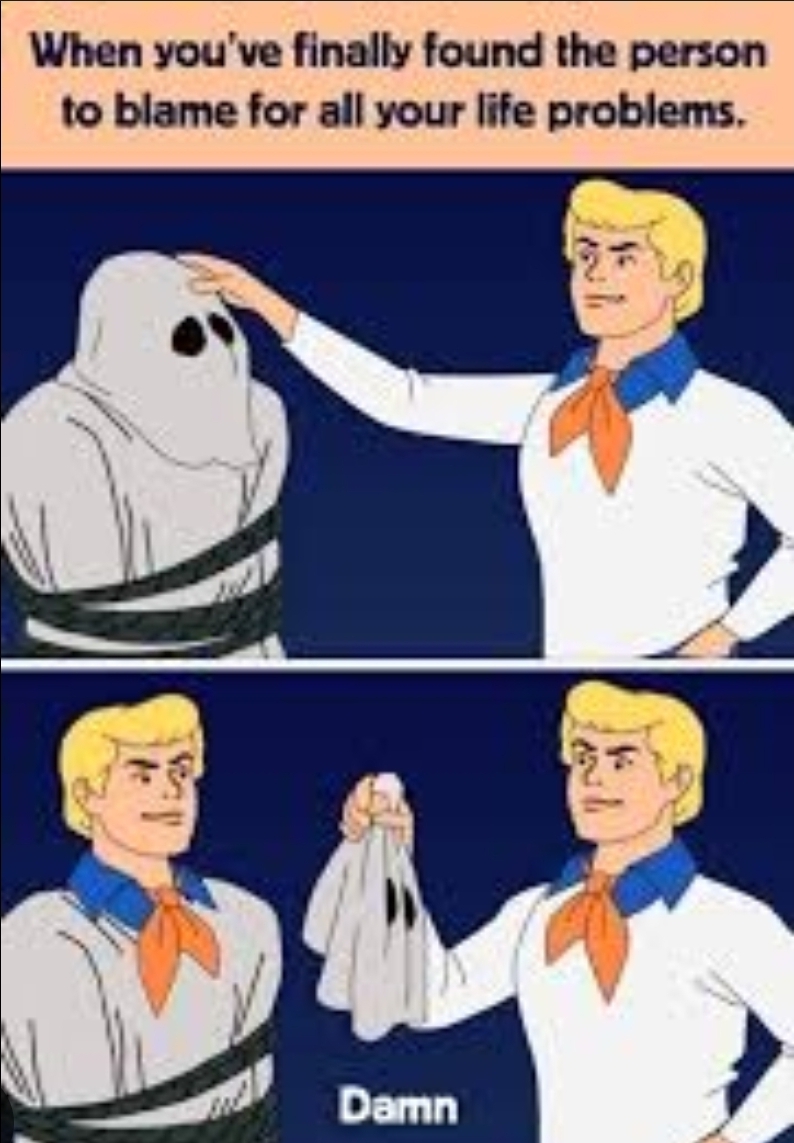
Result: The individual becomes dependent, malleable, and misaligned with truth.
These creeps recreate our culture, and they do it in a way that’s so gradual and interconnected that most people don’t notice until the cultural landscape has shifted so far that it feels “normal.”
They Change the Definitions First
- Moral Creep subtly redefines what “good,” “fair,” or “acceptable” means.
- Spiritual Drift Creep replaces absolute standards with “my truth” relativism.
- Once the language and moral reference points are changed, the rest of culture follows.
They Use the Institutions to Amplify the Shift
- Epistemic Capture controls media, education, and entertainment — the main channels for storytelling and “truth” delivery.
- Agenda Creep makes sure government policy aligns with and reinforces these shifts.
- The new culture gets legal backing and constant media repetition until it feels inevitable.
They Normalize New Behaviors Through Entertainment and Crisis
- Comfort Creep pushes leisure, pleasure, and self-focus over sacrifice and service.
- Fear Creep keeps the population anxious enough to accept authority’s guidance.
- Movies, music, sports, and influencers model the “new normal” until resistance feels socially costly.
They Redirect Resources
- Opportunity Cost Creep drains time, money, and energy away from family, faith, and civic engagement into distractions or bureaucratic programs.
- The things that hold old culture together (shared worship, local events, extended family) lose funding and priority.
They Embed the Changes Into Generational Memory
- Once children are raised under the new norms, the “old way” feels outdated or even dangerous.
- Families that resist are painted as fringe or extremist.
- Churches that resist are labeled intolerant or irrelevant.
- Communities that resist are targeted for “reform” funding or media shaming.
Result:
Over time, the creeps don’t just influence culture — they replace it. The moral compass, the shared language, and even the basic life rhythms of a nation are rewritten. By the time most people notice, the creeps have already embedded themselves in every cultural pillar, making reversal far more difficult.
How to Spot and Stop Them
- Pay attention to trends, not just events. Creeps live in the patterns.
- Ask, “Where does this lead?” A change may seem harmless now but dangerous later.
- Keep your anchors strong. Truth, moral principles, and faith keep you from drifting.
- Guard your sources. Make sure your information isn’t coming from one controlled pipeline.
- Defend small freedoms. Because they’re the first ones to be stolen quietly.

Bottom line:
Creeps are how you lose a country, a culture, and even your soul — without a shot being fired.
If you want to stop them, you can’t just wait for a crisis.
You have to notice the quiet, slow changes now… and push back before they become permanent.

